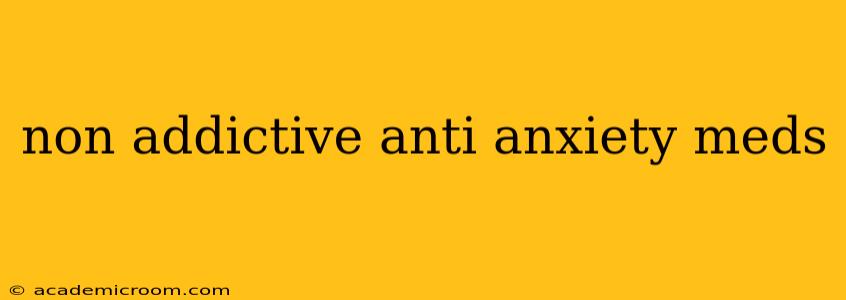Anxiety disorders affect millions, making the search for effective and safe treatment crucial. While many associate anxiety medication with addiction, several non-addictive options exist. This guide explores these alternatives, providing insights into their mechanisms, benefits, and potential side effects. Understanding these choices empowers individuals to make informed decisions in consultation with their healthcare provider.
What are Non-Addictive Anti-Anxiety Medications?
The term "non-addictive" is relative. While no medication is entirely without the potential for dependence or misuse, certain classes of anti-anxiety medications carry a significantly lower risk of physical dependence compared to benzodiazepines (like Xanax or Ativan), which are known for their addictive potential. This doesn't mean they're without side effects or potential for psychological dependence; responsible use under medical supervision is key. We'll focus on medications with a lower risk profile.
What are Some Examples of Non-Addictive Anti-Anxiety Medications?
Several medication classes offer anxiety relief with a reduced risk of addiction. These include:
-
Buspirone (Buspar): This medication works differently than benzodiazepines, affecting serotonin and dopamine neurotransmitters. It's often prescribed for generalized anxiety disorder (GAD) and takes several weeks to reach full effectiveness. It's considered less likely to cause dependence than benzodiazepines.
-
Certain Antidepressants: Some antidepressants, particularly selective serotonin reuptake inhibitors (SSRIs) like sertraline (Zoloft), paroxetine (Paxil), escitalopram (Lexapro), and fluoxetine (Prozac), and serotonin-norepinephrine reuptake inhibitors (SNRIs) like venlafaxine (Effexor) and duloxetine (Cymbalta), are effective in treating anxiety disorders. While they can have side effects, the risk of physical dependence is low. They often require several weeks to take full effect.
-
Beta-Blockers: Primarily used to treat high blood pressure, beta-blockers can also be helpful in managing performance anxiety (e.g., public speaking anxiety) by slowing down the physical symptoms of anxiety like rapid heartbeat and trembling. However, they don't address the underlying psychological causes of anxiety.
How Do These Medications Work?
Each medication class works through different mechanisms:
-
Buspirone: Modulates serotonin and dopamine activity in the brain.
-
SSRIs and SNRIs: Increase the levels of serotonin (and norepinephrine in the case of SNRIs) in the brain, neurotransmitters crucial for mood regulation and anxiety reduction.
-
Beta-Blockers: Block the effects of adrenaline and noradrenaline, reducing the physical symptoms of anxiety.
What are the Side Effects of Non-Addictive Anti-Anxiety Medications?
Side effects vary depending on the specific medication and individual response. Common side effects can include:
-
Buspirone: Dizziness, nausea, headache, drowsiness.
-
SSRIs/SNRIs: Nausea, headache, insomnia, sexual dysfunction, weight changes.
-
Beta-Blockers: Dizziness, fatigue, nausea, low blood pressure, bradycardia (slow heart rate).
It's crucial to discuss potential side effects with a healthcare professional.
Are There Natural Alternatives to Medication?
While medication can be highly effective, natural approaches can also play a role in managing anxiety. These include:
-
Therapy: Cognitive Behavioral Therapy (CBT) and other therapeutic approaches are highly effective in addressing the underlying causes of anxiety.
-
Lifestyle Changes: Regular exercise, a healthy diet, sufficient sleep, and stress-reduction techniques (yoga, meditation) can significantly improve anxiety symptoms.
What if My Anxiety is Severe?
Severe anxiety requires professional medical attention. Self-treating can be dangerous. A doctor or psychiatrist can assess your specific needs and recommend the most appropriate treatment plan, which may involve medication, therapy, or a combination of both.
How Long Does it Take for Non-Addictive Anti-Anxiety Medication to Work?
The onset of effectiveness varies widely depending on the medication. Buspirone can take several weeks to show significant improvement, while some antidepressants may take a few weeks to several months. Beta-blockers usually provide relief more quickly, especially for performance anxiety.
Can I Stop Taking Non-Addictive Anti-Anxiety Medication Suddenly?
It’s generally recommended to work with your doctor to gradually reduce the dosage of most anti-anxiety medications, including those considered less addictive. Stopping suddenly can lead to withdrawal symptoms, even with medications with a low risk of dependence.
This information is for general knowledge and does not constitute medical advice. Always consult with a healthcare professional for diagnosis and treatment of anxiety disorders. They can help determine the best course of action based on your individual needs and medical history.
